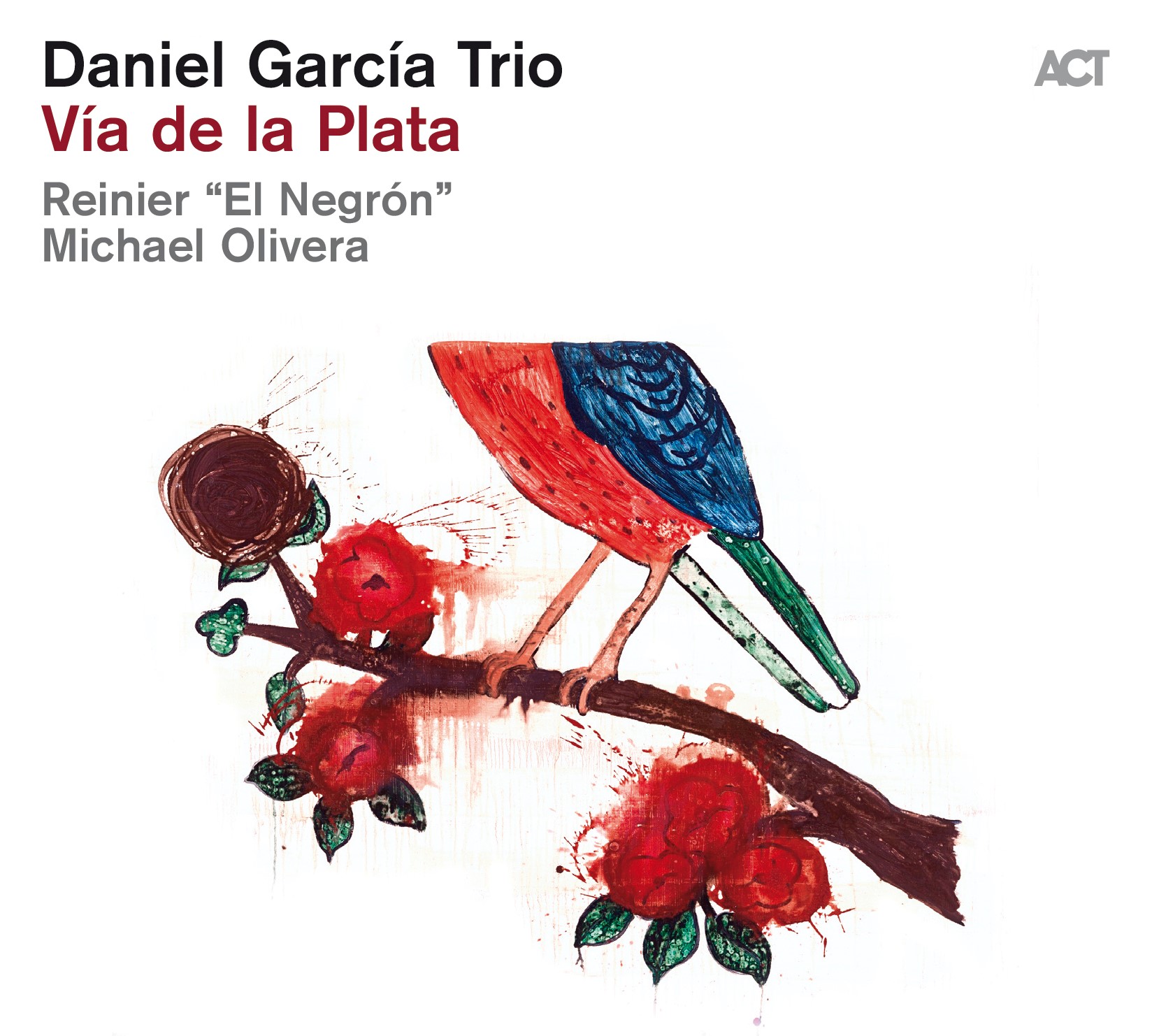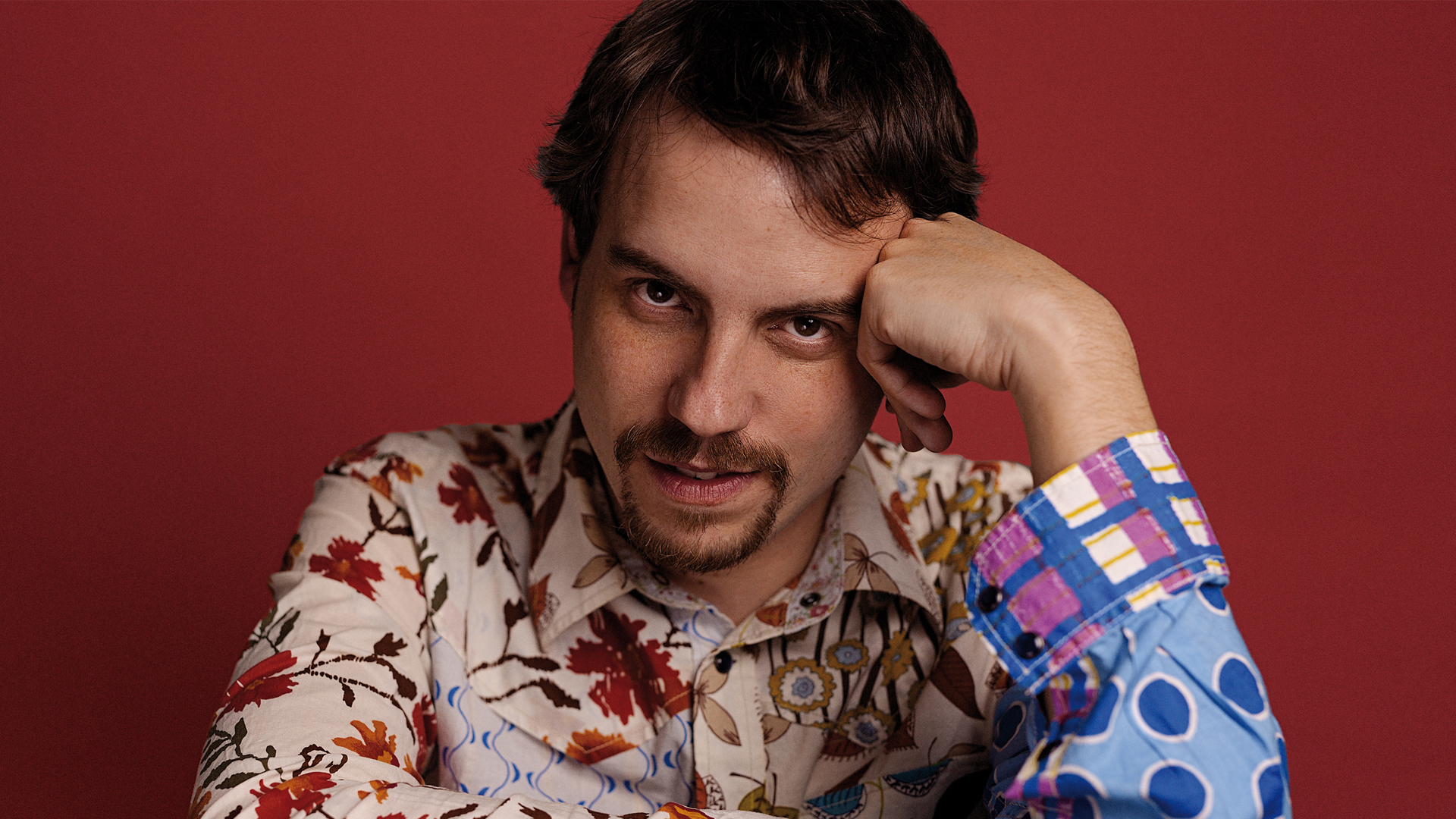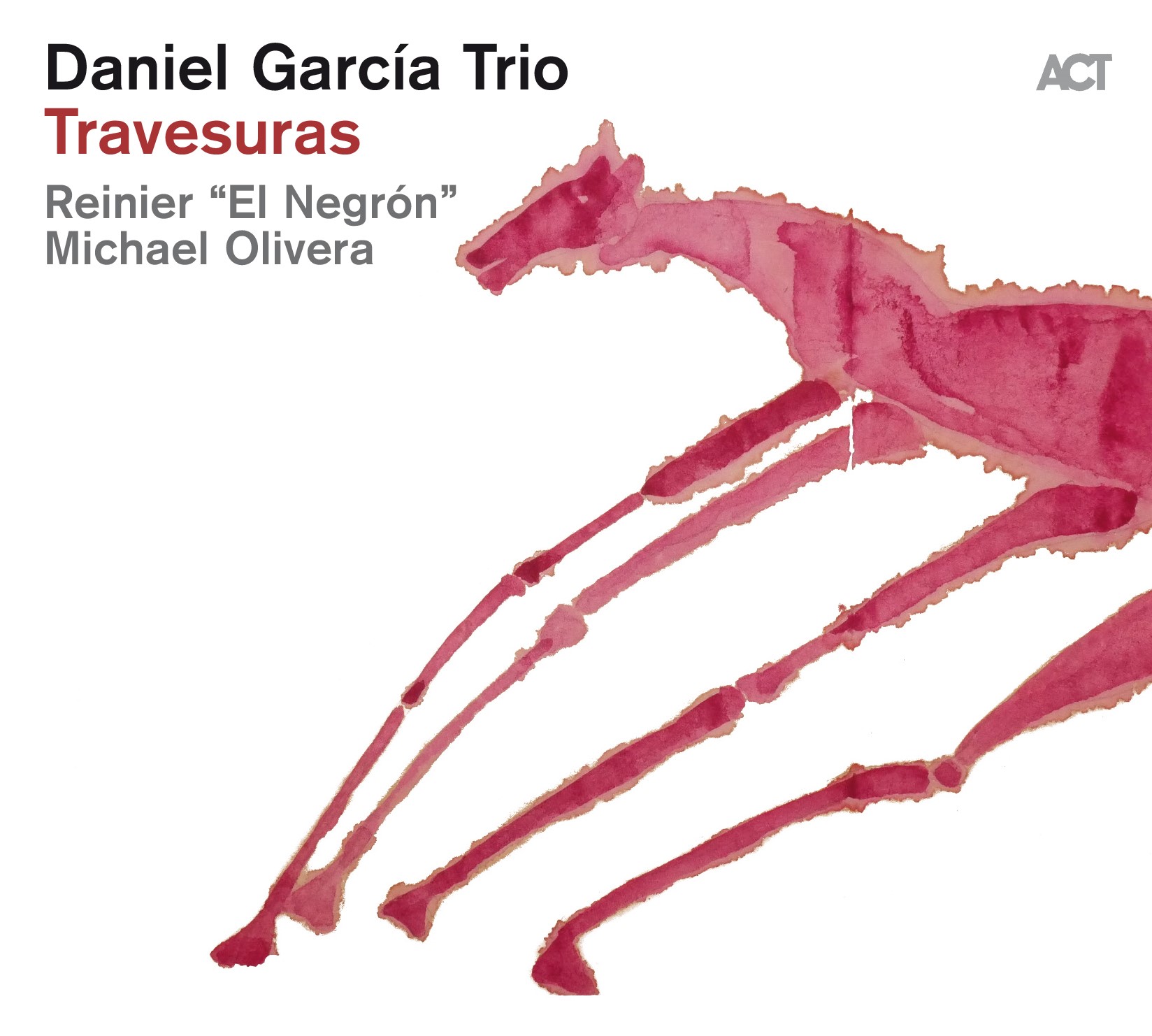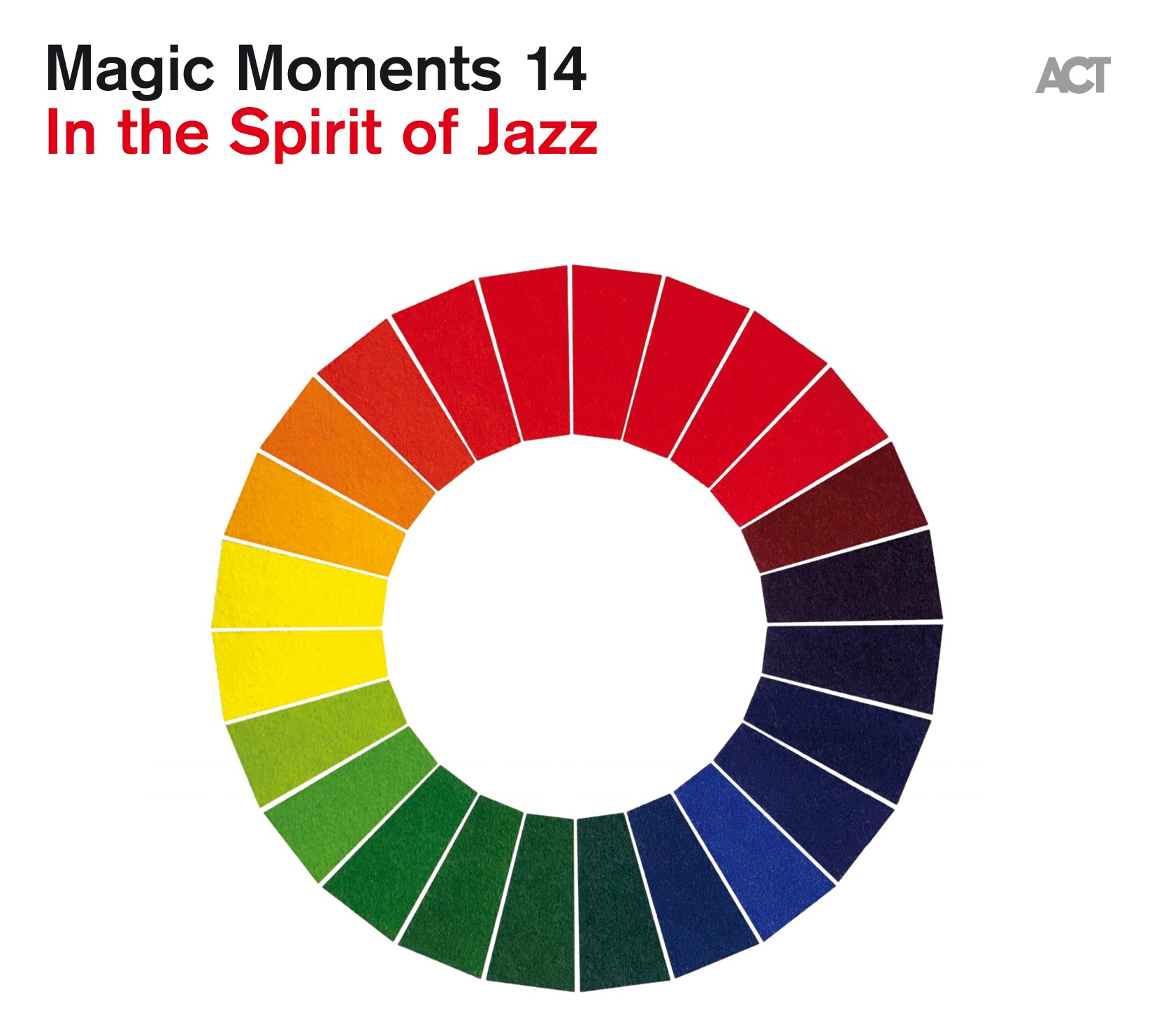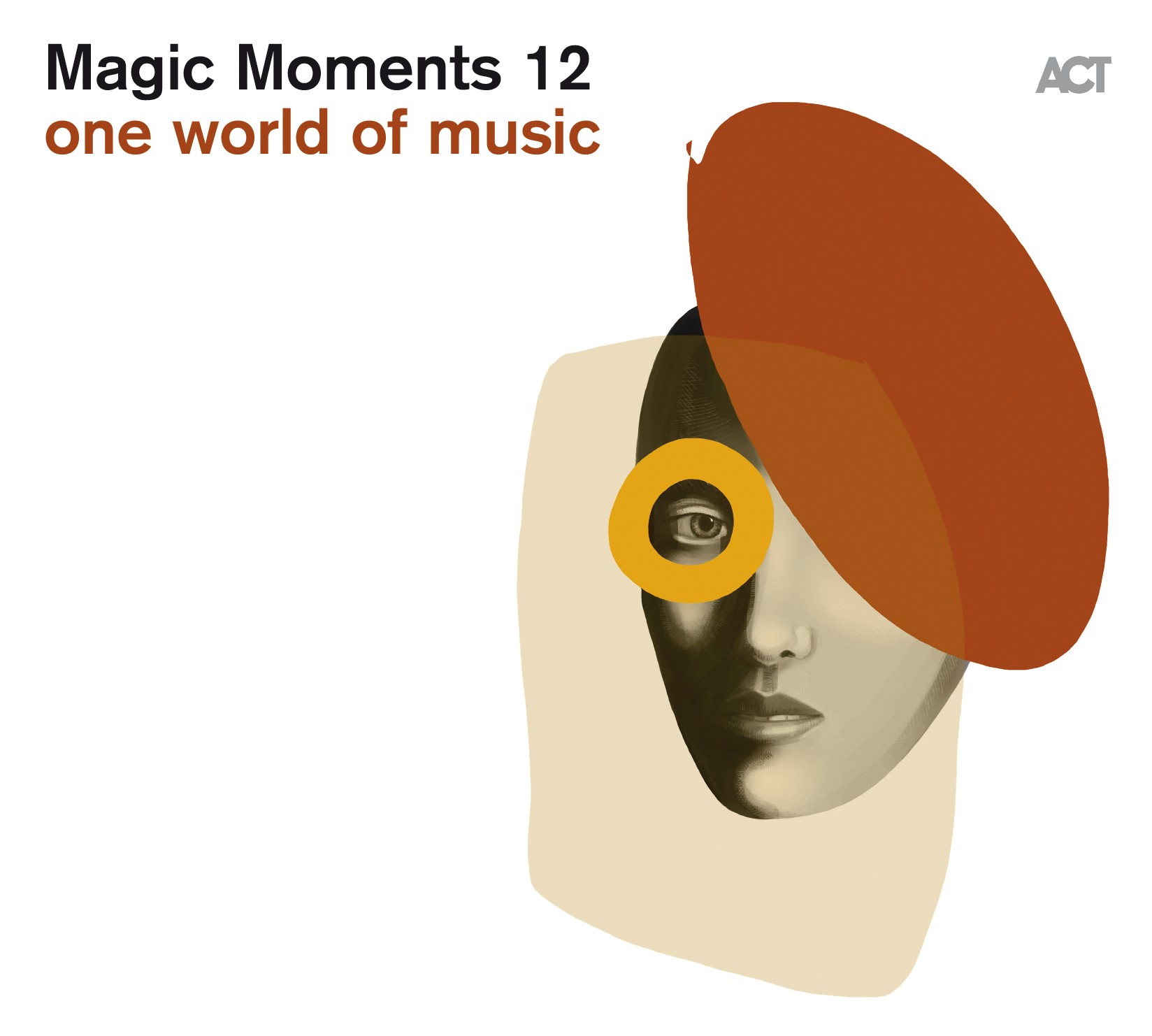Back
VÖ: 24.09.2021
Genre: Tipps für den Sommer, Piano Jazz
„Gedankenreich, klar, stilistisch lustwandlerisch und beseelt.“-Deutschlandfunk Kultur (DE)
Daniel García / piano, Fender Rhodes & synths
Reinier Elizarde “El Negrón” / acoustic bass
Michael Olivera / drums
Guests:
Ibrahim Maalouf / trumpet
Gerardo Núñez / guitar
Anat Cohen / clarinet
Produced by the artist Executive Producer: Siggi Loch All arrangements by Daniel García except Calima, by Gerardo Núñez Recorded by Shayan Fathi at Camaleón Music Studio, Madrid, Spain. Ibrahim Maalouf recorded by Oscar Ferran at Studio Diasporas, Ivry-Sur-Seine, France. Anat Cohen recorded at Paraiso Recording Studio, Rio de Janeiro, Brazil. Mixed and mastered by Shayan Fathi. Piano technician: David Izquierdo
the art in music:Cover art by Tal R: Fugl, 1995, by courtesy of Contemporary Fine Arts, Berlin
„Eine der aufregendsten Stimmen der aktuellen spanischen Jazzgeneration“, titelte Jazz thing über Daniel García, als dieser im April 2019 sein ACT-Debüt „Travesuras“ vorlegte. Tief taucht der Pianist in die Musik seiner Heimat ein und verbindet diese auf höchst eigenständige und ausdrucksstarke Weise mit dem Vokabular des modernen Jazz-Pianotrios. Auf „Vía de la Plata“ schreitet Garcia diesen eingeschlagenen Weg nun unbeirrt weiter fort.
Der in Madrid lebende García trägt ein tiefes Gefühl für die Geschichte in sich, die ihn geprägt hat. Das liegt nicht zuletzt daran, dass er in Salamanca geboren und aufgewachsen ist, einer geschichtsträchtigen Stadt mit mehreren bedeutenden archäologischen Stätten. In den Jahrhunderten seit dem Mittelalter spazierten Priesterschüler in ihren wallenden Gewändern die Calle Compañia entlang, eine Straße im Zentrum der Stadt, die von hohen Barockbauten beschattet wird. Die Stadt war auch eine der wichtigsten Stationen auf der Vía de la Plata (der „Sil-berstraße“), einer römischen Route vom Norden in den Süden der iberischen Halbinsel.
Klar, nachdenklich und selbstbewusst, wenn er spricht, hat García sowohl ein Verständnis als auch eine Leidenschaft dafür, was dieser alte silberne Faden durch sein Land bedeutet: Die Vía de la Plata gab der Halbinsel ihre Hauptschlagader. Sie ermög-lichte es Spanien auch, zum ersten Mal zusammenzukommen und sich zu definieren. Spanien existiert als Schmelztiegel verschiedener Kulturen, mit keltischen und nordischen Einflüssen, aus dem östlichen Mittelmeerraum und Afrika, aber auch aus Amerika. Die Vía de la Plata ist ein lebendiges Symbol dafür, wie „all dies in Spanien zusammenschmilzt", wie Garcia erklärt. Und das ist ihm hier - musikalisch - auch gelungen. Denn das Bewusstsein des Pianisten für diese verschiedenen Kulturen, die Spanien geformt haben, ist auf dem Album allgegenwärtig: Und die Gäste, die er für diese Aufnahme ins Studio eingeladen hat, repräsentieren musikalische Erbschaften aus verschiedenen Himmelsrichtungen.
Der in Beirut geborene Trompetenstar Ibrahim Maalouf ist auf zwei Stücken zu hören, dem nachdenklichen Opener, Manuel de Fallas „Canción del fuego fatuo“ (Lied des Irrlichts), und auf „Silk Road“, einem verlockenden Blick weiter nach Osten. Die charismatische Klarinettistin Anat Cohen, die in Israel aufgewachsen ist und jetzt in Amerika lebt, gibt mit diesem Al-bum ihr Debüt bei ACT. Sie erzeugt wunderbare Emotionen und eine flackernd zarte Schlusskadenz auf „Pai Lan“, einem Stück, das Garcías Frau gewidmet ist, wobei der Titel des Stücks der Name ist, unter dem sie (Belén) bekannt war, als sie in China lebte. Dritter Gast auf dem Album ist sein spanischer Landsmann, der Gitarrist Gerardo Núñez. Er und García sind gleichermaßen fasziniert von den Verbindungen zwischen Flamenco und Jazz. In dieser, ihrer ersten Zusammenarbeit hier, zeigen sie ein natürliches Einfühlungsvermögen, besonders in „Calima“, be-nannt nach dem Wind, der Sandstürme aus der Sahara heranträgt. Garcías Mitstreiter im Trio - Reinier Elizarde "El Negrón" (Bass), Michael Olivera (Schlagzeug) - stammen aus Kuba. García lernte sie in der Jazzszene Madrids kennen. Alle drei sind Mitte dreißig und sowohl auf als auch abseits der Bühne eng verbun-den.
Daniel García ist ein leidenschaftlicher Verfechter des musikalischen Erbes von Salamanca. Im Titeltrack des Albums wird dies eindrucksvoll deutlich: mit seinen berauschenden Anklängen an Ravel und den kamerunischen Coupé-Décalé tauschen García und Anat Cohen Melodiefragmente aus der Charrada, einem jahrhundertealten salamancanischen Bauerntanz, aus, wobei sich alles auf wundersame Weise nahtlos zusammenfügt.
Es ist nun ein Jahrzehnt her, dass García als Student am Berklee College of Music in Boston Preise gewann und von Danilo Pérez unterrichtet wurde. Garcia erinnert sich daran, wie der große panamaische Pianist ihn ermutigte, tiefer in die Musik seines Heimatlandes einzutauchen: „Du solltest die Musik machen, die du innerlich fühlst. Das ist nicht nur das, was du machst, das bist DU!“ Es ist, als ob dieser Ratschlag nie verschwunden wäre. Auf „Vía de la Plata“ hat Daniel Garcia nicht nur tief in seinem Erbe als Mensch wie Musiker gegraben und Wahrheiten darüber zu Tage gebracht. Er hat auch Wege gefunden, diese kraft der Emo-tionen in Musik auszudrücken: tief, überzeugend und umfassend auf diesem inspirierenden Album.
Daniel García / piano, Fender Rhodes & synths
Reinier Elizarde “El Negrón” / acoustic bass
Michael Olivera / drums
Guests:
Ibrahim Maalouf / trumpet
Gerardo Núñez / guitar
Anat Cohen / clarinet
Produced by the artist Executive Producer: Siggi Loch All arrangements by Daniel García except Calima, by Gerardo Núñez Recorded by Shayan Fathi at Camaleón Music Studio, Madrid, Spain. Ibrahim Maalouf recorded by Oscar Ferran at Studio Diasporas, Ivry-Sur-Seine, France. Anat Cohen recorded at Paraiso Recording Studio, Rio de Janeiro, Brazil. Mixed and mastered by Shayan Fathi. Piano technician: David Izquierdo
the art in music:Cover art by Tal R: Fugl, 1995, by courtesy of Contemporary Fine Arts, Berlin
„Eine der aufregendsten Stimmen der aktuellen spanischen Jazzgeneration“, titelte Jazz thing über Daniel García, als dieser im April 2019 sein ACT-Debüt „Travesuras“ vorlegte. Tief taucht der Pianist in die Musik seiner Heimat ein und verbindet diese auf höchst eigenständige und ausdrucksstarke Weise mit dem Vokabular des modernen Jazz-Pianotrios. Auf „Vía de la Plata“ schreitet Garcia diesen eingeschlagenen Weg nun unbeirrt weiter fort.
Der in Madrid lebende García trägt ein tiefes Gefühl für die Geschichte in sich, die ihn geprägt hat. Das liegt nicht zuletzt daran, dass er in Salamanca geboren und aufgewachsen ist, einer geschichtsträchtigen Stadt mit mehreren bedeutenden archäologischen Stätten. In den Jahrhunderten seit dem Mittelalter spazierten Priesterschüler in ihren wallenden Gewändern die Calle Compañia entlang, eine Straße im Zentrum der Stadt, die von hohen Barockbauten beschattet wird. Die Stadt war auch eine der wichtigsten Stationen auf der Vía de la Plata (der „Sil-berstraße“), einer römischen Route vom Norden in den Süden der iberischen Halbinsel.
Klar, nachdenklich und selbstbewusst, wenn er spricht, hat García sowohl ein Verständnis als auch eine Leidenschaft dafür, was dieser alte silberne Faden durch sein Land bedeutet: Die Vía de la Plata gab der Halbinsel ihre Hauptschlagader. Sie ermög-lichte es Spanien auch, zum ersten Mal zusammenzukommen und sich zu definieren. Spanien existiert als Schmelztiegel verschiedener Kulturen, mit keltischen und nordischen Einflüssen, aus dem östlichen Mittelmeerraum und Afrika, aber auch aus Amerika. Die Vía de la Plata ist ein lebendiges Symbol dafür, wie „all dies in Spanien zusammenschmilzt", wie Garcia erklärt. Und das ist ihm hier - musikalisch - auch gelungen. Denn das Bewusstsein des Pianisten für diese verschiedenen Kulturen, die Spanien geformt haben, ist auf dem Album allgegenwärtig: Und die Gäste, die er für diese Aufnahme ins Studio eingeladen hat, repräsentieren musikalische Erbschaften aus verschiedenen Himmelsrichtungen.
Der in Beirut geborene Trompetenstar Ibrahim Maalouf ist auf zwei Stücken zu hören, dem nachdenklichen Opener, Manuel de Fallas „Canción del fuego fatuo“ (Lied des Irrlichts), und auf „Silk Road“, einem verlockenden Blick weiter nach Osten. Die charismatische Klarinettistin Anat Cohen, die in Israel aufgewachsen ist und jetzt in Amerika lebt, gibt mit diesem Al-bum ihr Debüt bei ACT. Sie erzeugt wunderbare Emotionen und eine flackernd zarte Schlusskadenz auf „Pai Lan“, einem Stück, das Garcías Frau gewidmet ist, wobei der Titel des Stücks der Name ist, unter dem sie (Belén) bekannt war, als sie in China lebte. Dritter Gast auf dem Album ist sein spanischer Landsmann, der Gitarrist Gerardo Núñez. Er und García sind gleichermaßen fasziniert von den Verbindungen zwischen Flamenco und Jazz. In dieser, ihrer ersten Zusammenarbeit hier, zeigen sie ein natürliches Einfühlungsvermögen, besonders in „Calima“, be-nannt nach dem Wind, der Sandstürme aus der Sahara heranträgt. Garcías Mitstreiter im Trio - Reinier Elizarde "El Negrón" (Bass), Michael Olivera (Schlagzeug) - stammen aus Kuba. García lernte sie in der Jazzszene Madrids kennen. Alle drei sind Mitte dreißig und sowohl auf als auch abseits der Bühne eng verbun-den.
Daniel García ist ein leidenschaftlicher Verfechter des musikalischen Erbes von Salamanca. Im Titeltrack des Albums wird dies eindrucksvoll deutlich: mit seinen berauschenden Anklängen an Ravel und den kamerunischen Coupé-Décalé tauschen García und Anat Cohen Melodiefragmente aus der Charrada, einem jahrhundertealten salamancanischen Bauerntanz, aus, wobei sich alles auf wundersame Weise nahtlos zusammenfügt.
Es ist nun ein Jahrzehnt her, dass García als Student am Berklee College of Music in Boston Preise gewann und von Danilo Pérez unterrichtet wurde. Garcia erinnert sich daran, wie der große panamaische Pianist ihn ermutigte, tiefer in die Musik seines Heimatlandes einzutauchen: „Du solltest die Musik machen, die du innerlich fühlst. Das ist nicht nur das, was du machst, das bist DU!“ Es ist, als ob dieser Ratschlag nie verschwunden wäre. Auf „Vía de la Plata“ hat Daniel Garcia nicht nur tief in seinem Erbe als Mensch wie Musiker gegraben und Wahrheiten darüber zu Tage gebracht. Er hat auch Wege gefunden, diese kraft der Emo-tionen in Musik auszudrücken: tief, überzeugend und umfassend auf diesem inspirierenden Album.
"One of the most exciting voices of the current Spanish jazz generation," Jazz thing titled Daniel García when he released his ACT debut "Travesuras" in April 2019. The pianist delves deep into the music of his homeland and combines it in a highly unique and expressive way with the vocabulary of modern jazz piano trios. With "Vía de la Plata," Garcia continues down this path undeterred.
